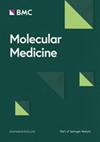Low-dose pro-resolving mediators temporally reset the resolution response to microbial inflammation
IF 6
2区 医学
Q1 BIOCHEMISTRY & MOLECULAR BIOLOGY
引用次数: 0
Abstract
Specialized pro-resolving mediators (SPMs) promote resolution of inflammation, clear infections and stimulate tissue regeneration. These include resolvins, protectins, and maresins. During self-resolving acute inflammation, SPMs are produced and have key functions activating endogenous resolution response for returning to homeostasis. Herein, we addressed whether infections initiated with ongoing inflammation alter resolution programs, and if low-dose repetitive SPM regimen re-programs the resolution response. Inflammation was initiated with zymosan (1 mg/mouse) followed by E. coli (105 CFU/mouse) infections carried out in murine peritonitis, and exudates collected at 4-72 h. Leukocytes were enumerated using light microscopy, percentages of PMN, monocytes and macrophages were determined using flow cytometry, and resolution indices calculated. Lipid mediators and SPM profiles were established using mass spectrometry-based metabololipidomics. Repetitive dosing with a SPM panel consisting of RvD1, RvD2, RvD5, MaR1 and RvE2 (0.1 ng/mouse each, i.p.) was given to mice, followed by zymosan challenge. Leukocyte composition, resolution indices and RNA-sequencing were carried out for the repetitive SPM treatments. E. coli infections initiated acute inflammation-resolution programs with temporal SPM production in the infectious exudates. Zymosan-induced inflammation prior to E. coli peritonitis shifted exudate resolution indices and delayed E. coli clearance. Lipid mediator metabololipidomics demonstrated that E. coli infection with ongoing zymosan-induced inflammation shifted the time course of exudate SPMs, activating a SPM cluster that included RvD1, RvD5 and MaR1 during the initiation phase of infectious inflammation (0-4 h); RvD5 and MaR1 were present also in the resolution phase (24-48 h). To emulate daily SPM regimens used in humans, a repetitive subthreshold dosing of the SPM panel RvD1, RvD2, RvD5, MaR1 and RvE2 each at 0.1 ng per mouse was administered. This low-dose SPM regimen accelerated exudate PMN clearance following zymosan-induced inflammation, and shortened the resolution interval by > 70%. These low-dose SPMs regulated genes and pathways related to immune response, chemokine clearance and tissue repair, as demonstrated by using RNA-sequencing. Infections encountered during ongoing inflammation in mice reset the resolution mechanisms of inflammation via SPM clusters. Low-dose SPMs activate innate immune responses and pathways towards the resolution response that can be reprogrammed.小剂量促进缓解介质可在时间上重置对微生物炎症的缓解反应
专门的促溶解介质(SPMs)可促进炎症消退、清除感染并刺激组织再生。这些介质包括resolvins、protectins和maresins。在自我解决急性炎症过程中,SPMs 会产生并具有激活内源性解决反应以恢复平衡的关键功能。在此,我们探讨了持续炎症引发的感染是否会改变溶解程序,以及低剂量重复 SPM 方案是否会重新编程溶解反应。在小鼠腹膜炎中,先用zymosan(1 毫克/只小鼠)引发炎症,然后用大肠杆菌(105 CFU/只小鼠)感染,并在 4-72 小时后收集渗出液。白细胞用光学显微镜计数,PMN、单核细胞和巨噬细胞的百分比用流式细胞术测定,并计算分辨率指数。使用基于质谱的代谢脂质组学建立脂质介质和 SPM 图谱。给小鼠重复注射由 RvD1、RvD2、RvD5、MaR1 和 RvE2 组成的 SPM 组(每组 0.1 纳克/只小鼠,静脉注射),然后进行酶联免疫吸附试验。对重复的 SPM 处理进行了白细胞组成、分辨率指数和 RNA 序列分析。大肠杆菌感染启动了急性炎症解决程序,并在感染性渗出物中产生了SPM。在大肠杆菌腹膜炎之前由Zymosan诱发的炎症改变了渗出物的溶解指数并延迟了大肠杆菌的清除。脂质介质代谢脂质组学研究表明,大肠杆菌感染与持续的紫棉素诱导炎症改变了渗出物SPM的时间进程,在感染性炎症的起始阶段(0-4小时)激活了包括RvD1、RvD5和MaR1在内的SPM集群;RvD5和MaR1也出现在消解阶段(24-48小时)。为了模仿人类使用的每日 SPM 方案,对 SPM 小组 RvD1、RvD2、RvD5、MaR1 和 RvE2 进行了重复的阈下给药,每只小鼠的剂量均为 0.1 纳克。这种低剂量 SPM 方案加快了紫霉素诱发炎症后渗出物 PMN 的清除速度,并将炎症消退间隔时间缩短了 70% 以上。通过使用 RNA 序列分析,这些低剂量 SPM 调节了与免疫反应、趋化因子清除和组织修复有关的基因和通路。在小鼠持续炎症期间遇到的感染通过SPM群重置了炎症的解决机制。低剂量 SPM 可激活先天性免疫反应,并激活可重新编程的解决反应途径。
本文章由计算机程序翻译,如有差异,请以英文原文为准。
求助全文
约1分钟内获得全文
求助全文
来源期刊

Molecular Medicine
医学-生化与分子生物学
CiteScore
8.60
自引率
0.00%
发文量
137
审稿时长
1 months
期刊介绍:
Molecular Medicine is an open access journal that focuses on publishing recent findings related to disease pathogenesis at the molecular or physiological level. These insights can potentially contribute to the development of specific tools for disease diagnosis, treatment, or prevention. The journal considers manuscripts that present material pertinent to the genetic, molecular, or cellular underpinnings of critical physiological or disease processes. Submissions to Molecular Medicine are expected to elucidate the broader implications of the research findings for human disease and medicine in a manner that is accessible to a wide audience.
 求助内容:
求助内容: 应助结果提醒方式:
应助结果提醒方式:


